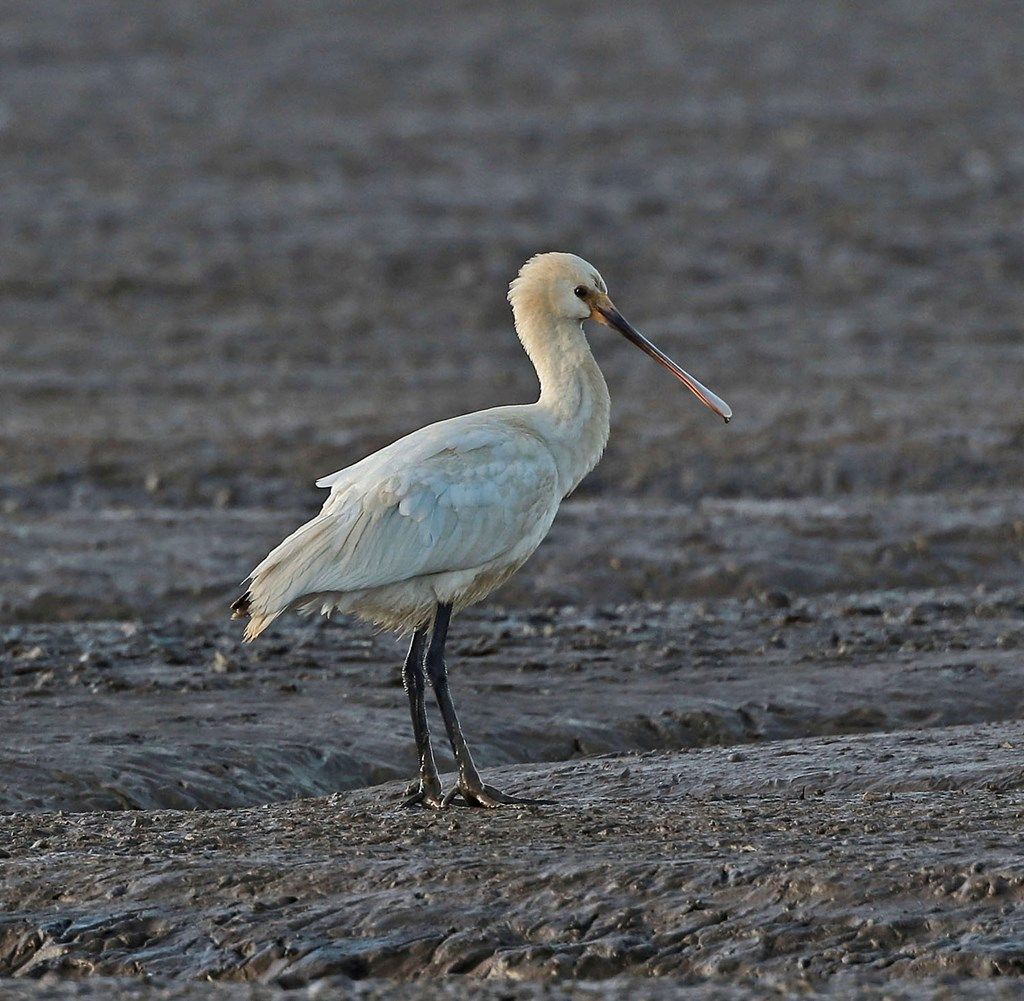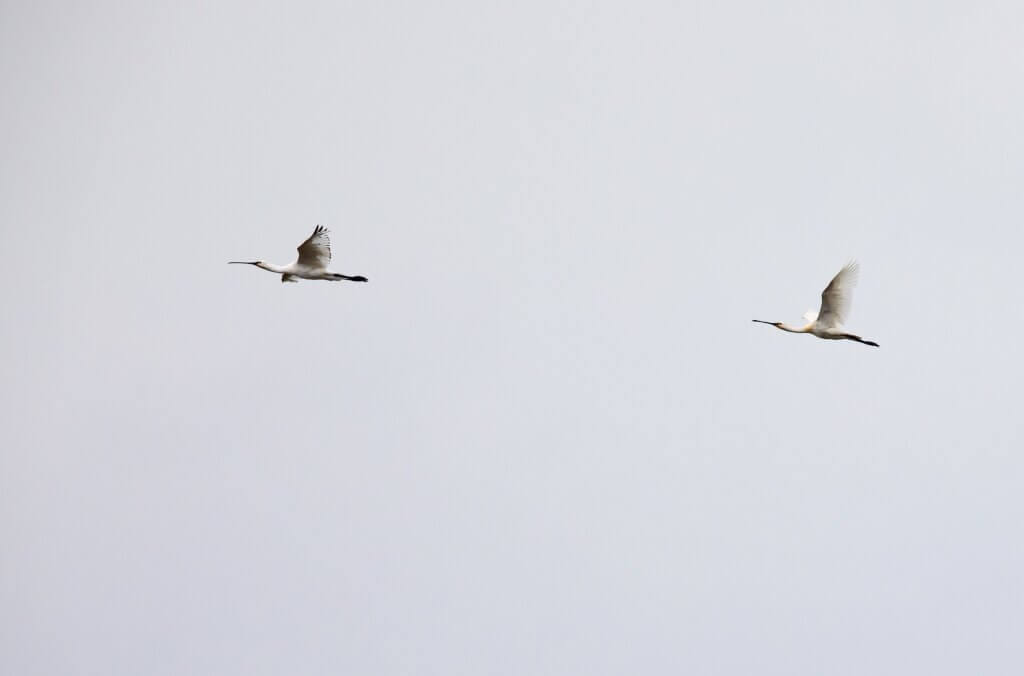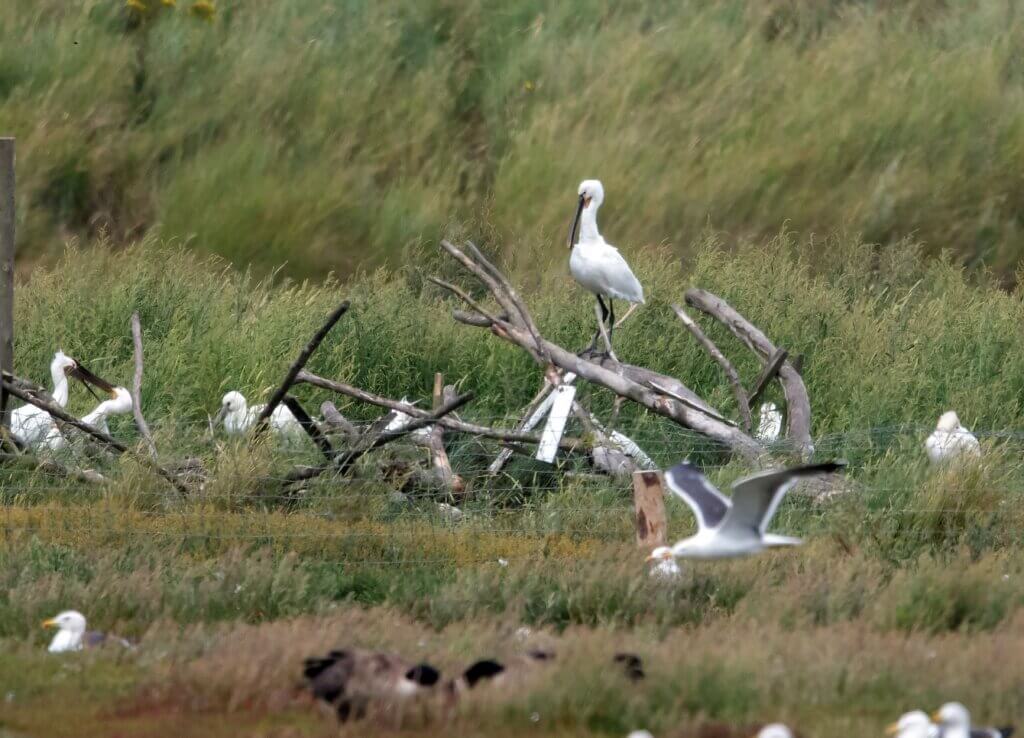Rare birds raise chicks in Suffolk for first time in over 300 years
- The spoonbill nesting site was remodelled to protect Havergate Island from flooding, also helping to alleviate flooding near homes and businesses further along the estuary.
- The RSPB encouraged the birds to nest by experimenting with a range of conservation techniques including using models of spoonbills and drones to safely identify chicks from afar
- Video footage of nest and chicks available
- These chicks are a sign of hope for the future of spoonbills in the UK.

Conservationists are celebrating the incredible sight of spoonbill chicks taking flight for the first time in three centuries in Suffolk after a wildlife haven was revamped to prevent the island from storm surges.
Rare birds, spoonbills, have successfully raised chicks for the first time in Suffolk since 16681. The birds were discovered nesting on RSPB Havergate Island nature reserve, Suffolk’s only island. The RSPB have been working over the last 15 years to encourage spoonbills to breed on the island.
After a huge tidal surge in 2013, the RSPB, with funding from Defra, lowered spillways into Havergate so it became a natural flood defence to accommodate climate-change related increases in the frequency and magnitude of North Sea surges. Over 500m of sea wall was reduced half a metre in height to allow water to flood into natural lagoons around it during storm surges. This protected the seawall around the island from mass failure and also helped protect nearby residents with additional flood storage in the lower Alde-Ore.
The Environment Agency said in 2013 the work was being carried out as part of research to develop their understanding of how natural flood management can protect residents from the risk of increased flooding in the future.
Aaron Howe, RSPB South Suffolk Sites Manager said: “We never gave up the hope spoonbill fledglings would take that very first, special flight from Havergate island once again. During lockdown at the RSPB we heard time and time again from people how they reconnected with the wildlife on their doorstep like never before and found solace in nature.
We hope the news that these rare and incredible birds had a breakthrough after 15 years work will help raise people’s spirits.”
Named after their spoon shaped beak (or bill), spoonbills are a very rare breeding bird in the UK and recognised as a species of conservation concern2. Before 1999, there had been no confirmed sightings since the 17th century but these days up to 100 spoonbills visit the UK every year. If you’re a bit of a night owl, you’ll probably feel some kinship with these heron-like birds – they are largely inactive during the day and prefer to feed at night. Their long spatula- shaped bill is full of sensitive nerve endings, which they sweep side-to-side through water for food. During the breeding season, spoonbills are even more unmistakable, sporting a striking yellow breast-band and shaggy crest feathers
In recent years, Havergate Island staff have seen increasing numbers of visiting spoonbills, but until now, no chicks survived.

The team used a range of techniques to encourage these unique birds to nest on the site, restoring natural habitats and even putting out models of spoonbills, complete with ready made“nests”. After creating special raised platforms, which mimic their natural nest sites, the visiting spoonbills began displaying breeding behaviours such as passing sticks to each other, grooming partners, preening and sleeping on the platforms. In 2019 conservationists had their first sign of hope when five pairs made nests, but sadly none were successful.
Following the glimmer of hope in 2019, the team installed a 350 metre long protective fence, partially submerged in water, around the nesting site. This year over 30 spoonbills visited the island and delighted the team when four chicks were successfully raised from two separate nests. As the nests are remote and some distance from the hide it was not possible for conservationists to see the nests. So a drone fitted with a zoom camera was specially purchased to confirm which spoonbills were actively nesting and feeding their chicks.
Aaron added: “Projects like these show how important reviving natural habitats is for the survival of our precious wildlife – and for people. Wildlife-rich greenspaces are not only vital for our wellbeing but can also provide other benefits for the community such as the natural flood defences at Havergate Island.
It is only because of our brilliant members and supporters we can protect these sites and the wildlife that call our reserves home. Together we can give nature the best shot at recovering and thriving.
The message is clear – if we look after nature, nature will look after us.
With protection of their all-important habitats we are hoping spoonbills will continue to thrive across the country, and at RSPB Havergate Island.”

The reserve, along with Minsmere, was instrumental in the successful re-establishment of avocets in the UK in the late 1940s, which had been extinct from the UK for a century.
The island is also home to the rare yellow-striped bear spider, starlet sea anemone along with a wealth of rare coastal plants.
Other sites where you can see spoonbills include:
Frampton Marsh, Lincolnshire (RSPB)
Gibraltar Point, Lincolnshire
Titchwell, Norfolk (RSPB)
Breydon water, Norfolk
Wells North Point, Norfolk
Stiffkey Fen, Norfolk
Rutland water, Leicestershire
Abberton Reservoir, Essex
Kilnsea Wetlands, Yorkshire
St Aidan’s, Yorkshire (RSPB)
Medmerry, Sussex (RSPB)
Cliffe Pools, Kent (RSPB)
Hazlewood Marshes, Suffolk
Banks Marsh, Lancashire
Parkgate Marsh, Lancashire
Brownsea Island and RSPB Arne, Dorset
ENDS
[registration_form]
Well done RSPB, brilliant work as usual. They are a great organisation. Nature and wildlife would be in real trouble in this country without them
We must, to be fair,also thank Defra and the Environment Agency for their support in this work
This is indeed good news With Spoonbills now spreading their breeding colonies to Suffolk. This part of the statement is however confusing “Before 1999, there had been no confirmed sightings since the 17th century but these days up to 100 spoonbills visit the UK every year.” given that Spoonbills have been visiting the UK for many years before 1999.
A fair bit of excited cheers all around, and well deserved. But how many people knew that Spoonbills bred in Orkney in 2018, raising three young to fledging? It was only the second record of the species this century and the 12th ever.
No I didn’t know that, but I know another pair bred on the Solway coast a few years before that, totally unexpected as were a pair of avocet in Falkirk. This is amazing stuff – when I was a wee boy in the seventies I was sickened that we’d lost our great bustards, cranes, white storks and spoonbills. Now they are all back with varying degrees of human assistance, three species of egret now breed here and the night heron, purple heron and little bittern might become regular breeders. There’s even speculation about the black stork becoming a resident.